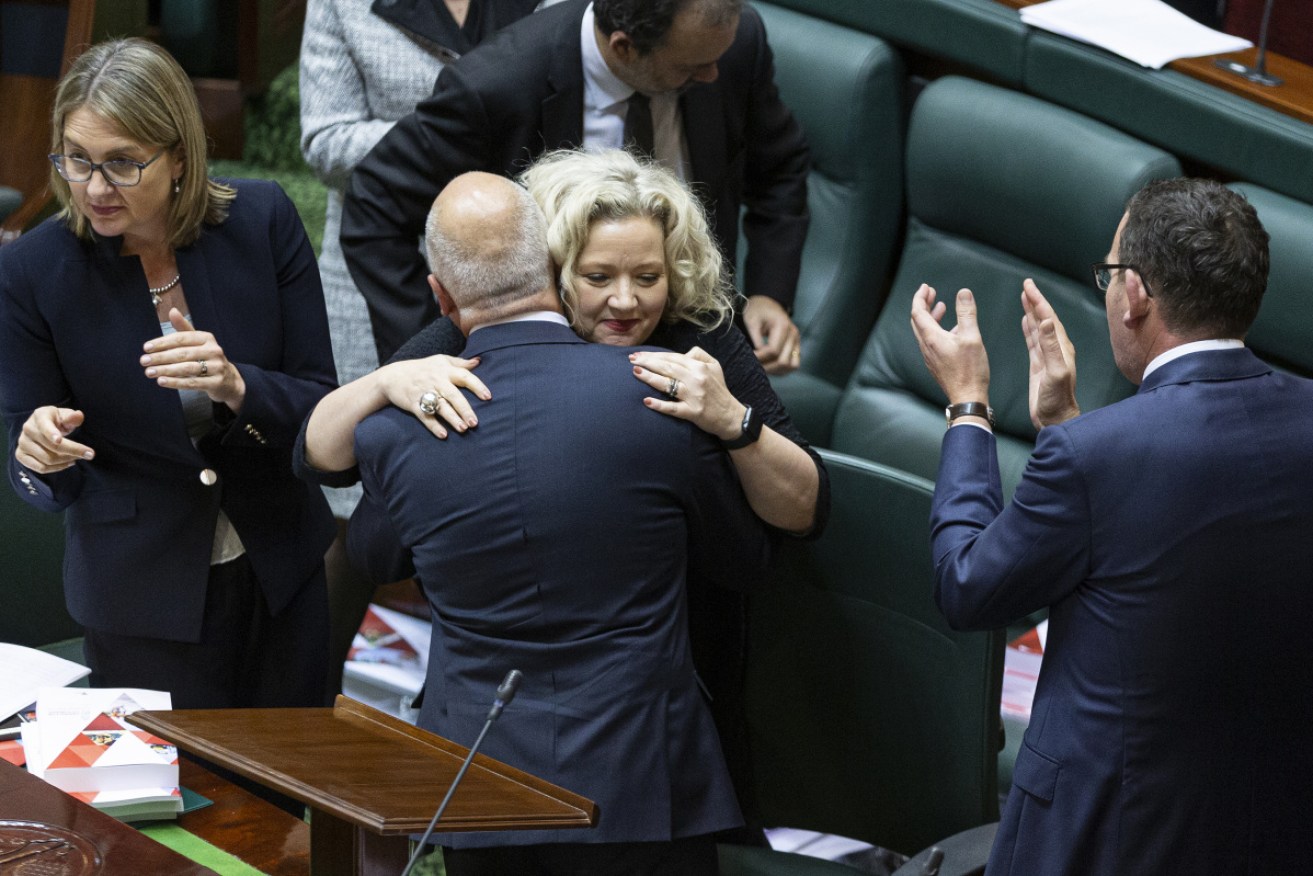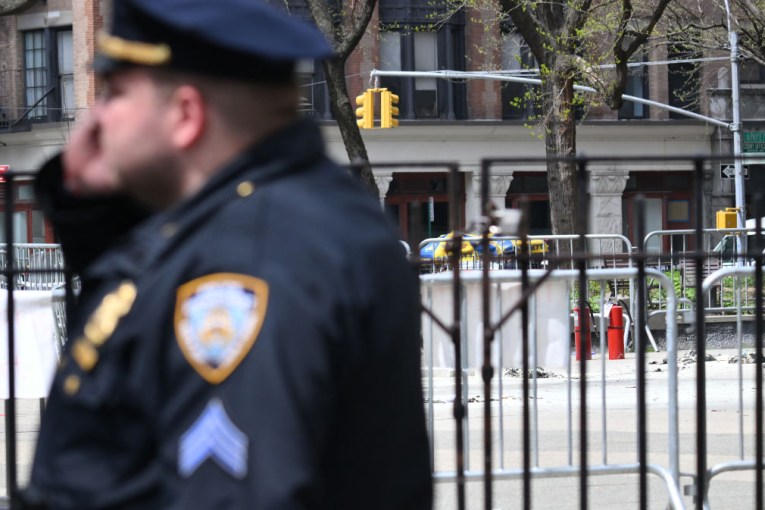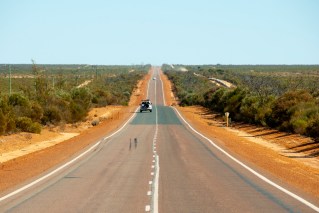Victorian Budget 2019: Car buyers, foreign investors and public service take a hit while stamp duty slumps

Victorian Treasurer Tim Pallas is congratulated by colleagues after speaking during the Victorian Budget hand down. Photo: AAP
Foreign property investors, luxury car buyers and public servants will bear the brunt of a steep decline in stamp duty revenue amid the sharpest 12-month fall in housing prices in Victorian history.
This includes $15.8 billion to fully fund the North East Link, and $6.6 billion to make good on an election promise to remove a further 25 level crossings, which would bring the total number of crossings removed since the Andrews government took office to 75.
In a budget dominated by the commitments Labor made during the state election campaign, one fresh announcement is $2 billion to upgrade the Sunbury line to enable higher-capacity trains to run on one of Melbourne’s busiest lines.
Platforms will be extended at 10 stations on the line.
The government says the upgrade will create room for an extra 113,000 passengers to travel on the line during peak times every week.
Accessibility upgrades will also be made at eight of those stations to make it easier for people in wheelchairs to board.
There is also $750 million to duplicate the Cranbourne line, in the city’s south-east, to allow trains to run to the city from every station every 10 minutes during the peak.
On the Hurstbridge line, 4.5 kilometres of track will be duplicated and new stations will be built at Greensborough and Montmorency.
Away from the city, 18 new V/Line VLocity trains, with a price tag of $340 million, will be shared between the Albury, Ballarat and Geelong lines.
As promised during the campaign, three new stations will be built in and around Bendigo – at Goornong, Raywood and Huntly – and a station will be re-established at Harcourt.

Treasurer Tim Pallas speaks about the budget at Parliament House on Monday. Photo: AAP
Foreign property investors face tax hike
The tax paid by foreign property investors will be increased from 7 to 8 per cent from July 1, bringing Victoria’s rate into line with that of New South Wales.
The tax paid by absentee landowners will be increased from 1.5 per cent to 2 per cent, also in line with NSW.
A land tax exemption will be abolished for land that is next door to a person’s home but on a separate title and without a separate residence.
The government says the removal of the exemption is designed to discourage land banking.
Mr Pallas defended the tax increases in the budget, saying they were targeted at people who had the capacity to bear a greater tax burden.
“We see this as being progressive, as being fair,” he said.
Revenue forecasts from stamp duty have been revised down by $5.2 billion since November, as the property market softens as a result of tighter lending.
Mr Pallas said over the past year Victoria had experienced the biggest 12-month decline in property prices in the state’s history.
Property prices in the state had fallen by about 10 per cent over the past year, while the volume of transactions had declined by about 15 per cent over the same period, Mr Pallas said.
But after continuing to decline in the second half of this year, the government expects the property slump to bottom out and begin to recover from early next year.
It has forecast steady growth in stamp duty revenue from 2020-21.
Luxury car owners slugged
Cars valued between $100,000 and $150,000 will be charged a duty of $14 per $200 of market value, while a duty of $18 per $200 of market value will be charged on vehicles worth more than $150,000.
But these charges will not apply to low-emissions passenger cars and cars used by farmers in the business of primary production.
Mr Pallas said the government was raising revenue in a manner that would “not substantially distress the broader community”.
“If you can buy a $200,000 Maserati, you’re not going to be particularly fazed by a slight increase in the rate of vehicle duty that you have to pay,” he said.
Kindergarten and dental care pledges funded
The budget makes good on a string of campaign promises, including $882 million to start the rollout of 15 hours a week of subsidised kindergarten for all three-year-olds.
The rollout will start next year in six regional local government areas – Buloke, Hindmarsh, Northern Grampians, South Gippsland, Strathbogie and Yarriambiack – before being expanded more broadly.
The government has promised every three-year-old Victorian child will have access to at least five hours per week of kinder by 2022.
All Victorian government school students will get free dental care at a cost of $322 million, with the first school dental vans expected to hit the road later this year.
The government says the service will save families about $400 a year per child on dental costs.
The budget contains almost $300 million for more paramedics, ambulances and ambulance stations.
The VHA welcomes the Andrews Labor Government's commitment to fund growth in Victorian public hospitals and school dental vans as part of the 2019-2020 State Budget. Read more in the VHA media release here >> https://t.co/E4zic6a5Ft #VicBudget
— VHA (@vichealthassoc) May 27, 2019
Public service told to find $1.8 billion
Separately, the government is demanding the public service find $1.8 billion in savings through efficiencies to free up money to spend on priority areas.
Mr Pallas said it would be up to departments to decide how to save the money and the process would be overseen by the secretaries of the departments of Premier and Cabinet, and Treasury and Finance.
He said forced redundancies would be a last resort.
Mr Pallas had promised a “budget of hard choices” and was asked in the budget lockup which decision had been the toughest.
He nominated the $1.8 billion efficiency dividend, and the government’s hardball approach to negotiating enterprise agreements with public sector workers, including early childhood workers, firefighters and public transport workers.
The government has offered these workers an annual increase of 2 per cent, a proposal that has been rejected by unions.
Debt expected to rise above $50 billion
Net debt, which is projected to reach $22.8 billion in the current financial year, is forecast to balloon to $54.9 billion by 2022-23.
With a busy program of ambitious projects, including the Melbourne Airport rail link and the suburban rail loop, Mr Pallas said debt as a proportion of the Victorian economy would continue to grow beyond this period, to peak at 12 per cent of gross state product.
Mr Pallas said these projects were vital for the state to cope with population growth.
The budget forecasts a surplus of $1 billion for 2019-20, growing to $1.5 billion in 2020-21, $3.9 billion the following year and $4.9 billion in 2022-23.

The Budget was handed down in parliament in Melbourne on Monday. Photo: AAP
Government promises ‘constructive’ work with PM
The state budget was originally scheduled for April 30, but was postponed until after the federal election due to what Mr Pallas called the “starkly contrasting offerings” from the two major parties.
Mr Pallas said the budget was about $2.6 billion worse off as a result of Scott Morrison’s election victory, principally due to federal Labor’s $2.5 billion commitment to the Metro Tunnel project, which was not matched by the Coalition.
“My party on election night was not as much fun as I think Josh Frydenberg’s was,” Mr Pallas said.
But he said the state government had moved on from the result.
“The Australian people have made their decision … we’ll work as constructively as we can with them [the Morrison government].”
Fifth Labor budget. Fifth Labor surplus.
Fifth year of keeping our promises. Fifth year of delivering for all Victorians. #VicBudget pic.twitter.com/lmPM3xFpjb
— Dan Andrews (@DanielAndrewsMP) May 27, 2019
Solar panel program expanded
The government’s existing scheme to provide rebates and zero-interest loans for solar panels, hot water systems and batteries will be expanded, including to renters, at a cost of $1.3 billion.
The Essential Services Commission will get an extra commissioner, dubbed “an energy cop on the beat” by the government, to prosecute misbehaviour by energy retailers.
The civil penalties for retailers who wrongfully disconnect customers will increase to $250,000 and the criminal penalties for misleading or deceiving customers will rise to $1 million.








